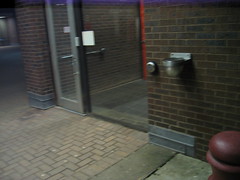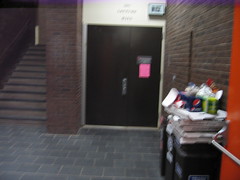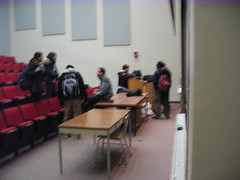All places must be maintained. I'll get into how and why a later. First I need to define space and place.
Space: Any container with any dimensions.
I'll clarify this a little. A container is anywhere where something can exist. A dimension is any measurable quality. I think every quality is measurable, but if one wasn't then it wouldn't be a dimension. I'll give some examples. Inside a car - Is it a container? yea it's pretty clear things can be in it. What are its dimensions?- The obvious ones are the spacial ones (up, down, left, and right), but there's also particles per cubic inch which makes the smell and texture of the air. A car has almost countless dimensions. Another example is a on a page. Is it a container? yea it holds symbols. What are it's dimensions? It has obvious spatial dimensions (width and height) like the car but also things like color and texture and the actual symbols on the page. Anything can be a space. When something is thought of as a space, it needs to be thought of in terms of what it holds and its dimensions.
Place: Any space with some relation to at least one person. So any space that anyone knows about would be place, since knowing about is a relation. The difference between place and space is that a place is defined by its relation to people while space is defined by its parameters.
While both spaces and places do change, place changes easier than space. For example, the place inside my car changes if I sell it. My relation to it is no longer where I sit in to get to work, but the space would stay the same. Changing the space is a little tougher, if i wanted to change the space inside the my car I would have to physically change it. This isn't necessarily too difficult, but any change to space would probably change the place as well.
My final project was done in the cemetery near Rockoff. Over the past 200-300 years that the cemetery has been around, it has changed a lot. Until the early-mid twentieth century, these changes were products of some type of maintenance. The two expansions from the original Presbyterian cemetery to Cheeseman cemetery to Willow Grove cemetery have preserved the original function of the cemetery: a place to go to mourn. The more recent changes are more interesting as they have happened due to a lack of maintanance and have changed the function of the cemetery. The only way for a cemetery to remain a place of mourning is if it expands. When no new bodies enter eventually, all the friends and family of the dead die or stop visiting. The problem is that the cemetery can't expand. It doesn't have anywhere to expand to. In fact, it needs to be reduced to make way for the functions of other places. It is impossible for this cemetery to remain a place of mourning.
With its original function gone, the cemetery changes as a place. It's become a place where people go at night.
Ok it's almost 9:30am so i'm gonna try to get to the point and fix this up later.
The point is the cemetery went bad and now is a breeding ground for thugs at worst and at best aesthetically displeasing. This only happened because the town allowed a place with a very specific function evolve on its own. This caused the cemetery lose its original function and rot. Now it acts almost like a tumor harming New Brunswick as well. I am going to go as far to say that whenever a place with a specific function is neglected it will decay into some form similar to this cemetery. Personally I think the cemetery should be torn down for housing or fixed up and preserved as a museum.
What's interesting is when you compare such a tangible space to a space on the web or in a hard drive. In tangible places (like the cemetery) it is hard to control what happens there, both tearing it down and preserving it would be difficult, so it's left to sit. Places in cyberspace are much easier to control. Whenever something becomes obsolete, breaks, or loses function it is easy to immediately destroy it to stop it from taking up space, or to archive it away so it can be kept to analyze, but doesn't interact with the full system. At the same time places in cyberspace are almost exclusively affected by users. Because of this cyberspaces don't face many of the same issues that tangible spaces do.
Tuesday, April 28, 2009
Tuesday, April 7, 2009
Tuesday, March 3, 2009
Time matters
Have you ever read The Sound and the Fury? I had to read it in high school, but I didn't really get it. I don't think I even fully read it. It's supposed to be good, and more importantly the book focuses a lot on time. There's a character named Jason Compton who tries to play the stock market. It doesn't work out for him because he'll get a hot tip, but by the time he can make a purchase it's too late. The stock he wants to buy already passes it's local extrema (it's local peak) by the time he gets it.
It's almost like Jason was born in the wrong time. His entire stock trick could actually work in today's world. Through a computer or a broker it's possible to make a transaction in minutes. There are even people with connections to the market that are so fast they can make a trade in less than 1/1ooth of a second. rather than need a hot tip people just need to be able to click fast enough when the arrow turns green and then click fast enough when it turns red.
Now it's not about making things happen as instantaneous as possible, it's about making the instantaneous action at the right time.
It's almost like Jason was born in the wrong time. His entire stock trick could actually work in today's world. Through a computer or a broker it's possible to make a transaction in minutes. There are even people with connections to the market that are so fast they can make a trade in less than 1/1ooth of a second. rather than need a hot tip people just need to be able to click fast enough when the arrow turns green and then click fast enough when it turns red.
Now it's not about making things happen as instantaneous as possible, it's about making the instantaneous action at the right time.
Tuesday, February 17, 2009
My answers to some questions
(Amanda Downs on C++) How come we are never satisfied? Networks are becoming faster, more pervasive, and more essential - why do we not value the important changes rather than stress over the problems?
I believe people are never satisfied because of the imagination. No matter what currently exists people can imagine something that works faster or does more. This same idea applies to networks. The creators and users of networks can always imagine what the world would be like if networks worked more efficiently and could have more applications, and because of this problems are highlighted and creators and users are motivated to do what they can to make networks fit the image in their mind.
(Kathryn Nguyen on Foucault) If utopias are unreal spaces, which do not exist, why does everyone strive to create them?
The vision of a Utopia motivates people to do things. When people visualize a perfect place they have a goal and try to create it. Even if and when someone realizes that actually achieving his or her Utopia is impossible s/he is still motivated to make his/her perfect place because it can closer and closer to perfection.
(Gabriella Potievsky on Yi Fu Tuan) How does society have a strong impact on the development of spacial skill?
In general, people tend to learn what they need. Each society demands a different set of spacial skills, so each different society will develop different spacial skills. For example, an Urban society will stress knowing how to cross a street without getting hit and how to utilize mass transit, while a suburb will stress knowing what parts of town are useful for what things (like what street you can play with a football without any cars coming).
Sunday, February 15, 2009
foucault questions
What type of place wouldn't fit the criteria needed to be a heterotopic space?
What does it mean to have place?
Why are heterotopias important?
Does the space in a heterotopia have special qualities?
How do people act in heterotopic places compared to non-heterotopic places?
What does it mean to have place?
Why are heterotopias important?
Does the space in a heterotopia have special qualities?
How do people act in heterotopic places compared to non-heterotopic places?
Saturday, February 14, 2009
5 questions on space
How would people perceive space without sight or touch?
How much spacial knowledge is needed to live everyday life?
How important are symbols for defining space?
Why does history change how we define a space?
What type of spacial knowledge is worth learning?
How much spacial knowledge is needed to live everyday life?
How important are symbols for defining space?
Why does history change how we define a space?
What type of spacial knowledge is worth learning?
Wednesday, February 11, 2009
C++ questions
1)What effects on quality of social interactions do new technologies have?
2)How does the use of tools change the emotions of an action?
3)If a computer can do something do people still need to be able to do the same thing?
4)How effective can a camera be if there isn't someone around to watch it 24/7?
5)In what ways can growing databases be inadequate at compensating for an aging/decaying mind?
2)How does the use of tools change the emotions of an action?
3)If a computer can do something do people still need to be able to do the same thing?
4)How effective can a camera be if there isn't someone around to watch it 24/7?
5)In what ways can growing databases be inadequate at compensating for an aging/decaying mind?
Saturday, February 7, 2009
Finding artifacts
What would a homeless black man own or discard? Probably tattered clothes, cigarette butts, beer vesicles, napkins, and any of the trash that can be found on floor.
Last Sunday at around 5pm went I looking for these things. They were all over the place. Discarded, cigarette butts used, remnants of cheap food, and clothes left behind covered the streets of New Brunswick. The problem was there was no way to know that any of these things actually belonged to a homeless person. In fact, I was almost sure that nothing I found on the streets belonged to any homeless people. While walking around the our designated block i saw hundreds of college students wearing tattered clothes, smoking cigarettes, and eating fast food. I could only assume that everything I found belonged to college students. I decided that I actually needed to follow a black homeless man and pick up his garbage.
My new problem was how i was going to find a homeless black man. I checked two hot spots i thought would be sure things by I couldn't find any. None in Alexander Library or the train station. In an act of desperation I went to a homeless shelter outside of the boundaries of the project. In the shelter I talked to a variety of homeless people, including some who were black. Unfortunately, none of them had anything they were willing to give up. In the end I ended up compromising my artist vision and just shared garbage with ambiguous ownership with my group.
Last Sunday at around 5pm went I looking for these things. They were all over the place. Discarded, cigarette butts used, remnants of cheap food, and clothes left behind covered the streets of New Brunswick. The problem was there was no way to know that any of these things actually belonged to a homeless person. In fact, I was almost sure that nothing I found on the streets belonged to any homeless people. While walking around the our designated block i saw hundreds of college students wearing tattered clothes, smoking cigarettes, and eating fast food. I could only assume that everything I found belonged to college students. I decided that I actually needed to follow a black homeless man and pick up his garbage.
My new problem was how i was going to find a homeless black man. I checked two hot spots i thought would be sure things by I couldn't find any. None in Alexander Library or the train station. In an act of desperation I went to a homeless shelter outside of the boundaries of the project. In the shelter I talked to a variety of homeless people, including some who were black. Unfortunately, none of them had anything they were willing to give up. In the end I ended up compromising my artist vision and just shared garbage with ambiguous ownership with my group.
Monday, January 26, 2009
What I carry with me
I left my poncho rain coat thing at home. I don't think I've actually had it on me since the semester started, which is bad because odds are it will eventually rain and I won't have it. There was once a time when the rain wouldn't bother me. In those days i didn't leave my rain coat poncho thing at home because I forgot it, but because I didn't need it. Back then my rain coat poncho thing was an umbrella. I let one of my friends borrow it on a rainy day and he lost it. I've considered buying a new umbrella, but I think what I have now works well. I don't think anyone will want to borrow a raincoat poncho thing.
Subscribe to:
Posts (Atom)








